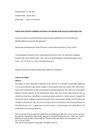 10 citations,
January 2014 in “Genetics and Molecular Research”
10 citations,
January 2014 in “Genetics and Molecular Research” Liaoning Cashmere goat hair follicles show synchronized growth patterns with lowest activity in May.
 10 citations,
January 2013 in “Journal of skin cancer”
10 citations,
January 2013 in “Journal of skin cancer” PKC ε increases hair follicle stem cell turnover and may raise skin cancer risk.
 10 citations,
December 2011 in “Cell Transplantation”
10 citations,
December 2011 in “Cell Transplantation” Researchers successfully grew human hair follicle cells that could potentially lead to new hair loss treatments.
 10 citations,
January 2004 in “Dermatologic Surgery”
10 citations,
January 2004 in “Dermatologic Surgery” Storing hair follicles in special buffers with added protective substances can increase hair growth and reduce cell death.
 9 citations,
July 2020 in “Journal of Animal Physiology and Animal Nutrition”
9 citations,
July 2020 in “Journal of Animal Physiology and Animal Nutrition” Melatonin given to pregnant rabbits improved their babies' fur quality.
 9 citations,
August 2018 in “Biomedical dermatology”
9 citations,
August 2018 in “Biomedical dermatology” A peptide called DPS-1 helps human scalp cells grow and stimulates hair growth in mice.
9 citations,
January 2015 in “Springer eBooks” Using hair follicles can improve skin drug delivery.
 9 citations,
January 2005 in “Experimental dermatology”
9 citations,
January 2005 in “Experimental dermatology” Melatonin receptors in hair follicles help regulate hair growth and could treat hair loss.
 9 citations,
February 2022 in “Archives animal breeding/Archiv für Tierzucht”
9 citations,
February 2022 in “Archives animal breeding/Archiv für Tierzucht” A circular RNA helps cashmere goat hair cells become hair follicles by blocking a molecule to boost a gene important for hair growth.
 9 citations,
November 2021 in “Frontiers in Cell and Developmental Biology”
9 citations,
November 2021 in “Frontiers in Cell and Developmental Biology” PBX1 helps reduce aging and cell death in hair follicle stem cells by decreasing DNA damage, not by improving DNA repair.
 9 citations,
August 2019 in “Journal of The European Academy of Dermatology and Venereology”
9 citations,
August 2019 in “Journal of The European Academy of Dermatology and Venereology” Minoxidil activation by hair enzymes predicts treatment success for female hair loss.
9 citations,
June 2019 in “Cell cycle/Cell cycle (Georgetown, Tex. Online)” A specific RNA increases hair stem cell growth and skin healing by affecting a protein through interaction with a microRNA.
9 citations,
April 2019 in “Bioscience, biotechnology, and biochemistry” Ten miRNAs may play key roles in starting secondary hair follicle development in sheep foetuses.
9 citations,
June 2016 in “Stem cells” Overexpression of sPLA2-IIA in mouse skin reduces hair stem cells and increases cell differentiation through JNK/c-Jun pathway activation.
 9 citations,
January 2016 in “International Journal of Medical Sciences”
9 citations,
January 2016 in “International Journal of Medical Sciences” Increasing Wnt10b levels can help grow new hair follicles in mice.
 9 citations,
January 2015 in “Fundamental & clinical pharmacology”
9 citations,
January 2015 in “Fundamental & clinical pharmacology” Cyclosporine A helps hair grow by blocking a process that would otherwise cause hair cells to die.
 9 citations,
October 2013 in “Journal of Investigative Dermatology”
9 citations,
October 2013 in “Journal of Investigative Dermatology” The OVOL1 gene, controlled by β-catenin, is crucial for creating hair follicles.
 9 citations,
July 2013 in “Experimental Dermatology”
9 citations,
July 2013 in “Experimental Dermatology” Aging reduces the ability of human hair follicle cells to form new cell colonies.
 9 citations,
July 2011 in “Scientific Reports”
9 citations,
July 2011 in “Scientific Reports” Changes in the HR gene have influenced hair growth and may lead to hair loss conditions in humans.
 9 citations,
April 2006 in “American Journal of Pathology”
9 citations,
April 2006 in “American Journal of Pathology” SGK3 is essential for proper hair growth and health.
 9 citations,
August 2005 in “Experimental Dermatology”
9 citations,
August 2005 in “Experimental Dermatology” Modified pep7, named EPM peptide, effectively promotes hair growth at low concentrations and works well with minoxidil.
9 citations,
June 1999 in “Journal of Investigative Dermatology” The HPV type 11 region activates hair-specific gene expression in mice.
9 citations,
March 1998 in “Journal of Dermatological Science” Improper regulation of hair follicle processes causes hairlessness.
 8 citations,
August 2020 in “Domestic Animal Endocrinology”
8 citations,
August 2020 in “Domestic Animal Endocrinology” Melatonin improved cashmere production in goats during the first cycle but had no lasting effects on the next cycle.
8 citations,
July 2020 in “BMC genomics” The research found genes that change during cashmere goat hair growth and could help determine the best time to harvest cashmere.
 8 citations,
May 2018 in “The Journal of Allergy and Clinical Immunology”
8 citations,
May 2018 in “The Journal of Allergy and Clinical Immunology” Activating the Nrf2 pathway reduces inflammation and cell activation in human hair follicles, suggesting a potential treatment for certain hair loss conditions.
 8 citations,
February 2016 in “The American Journal of Dermatopathology”
8 citations,
February 2016 in “The American Journal of Dermatopathology” Hair transplants can make hair follicles larger and hair shafts thicker.
 8 citations,
July 2022 in “BMC neuroscience”
8 citations,
July 2022 in “BMC neuroscience” Transplanted hair follicle stem cells improved brain function and reduced damage after a stroke in rats.
 8 citations,
June 2022 in “Scientific Reports”
8 citations,
June 2022 in “Scientific Reports” LGR5 is a common marker of hair follicle stem cells in different animals and is important for hair growth and regeneration.
8 citations,
October 2021 in “Experimental cell research” Engineered vesicles from macrophages help hair growth in mice and humans.






















